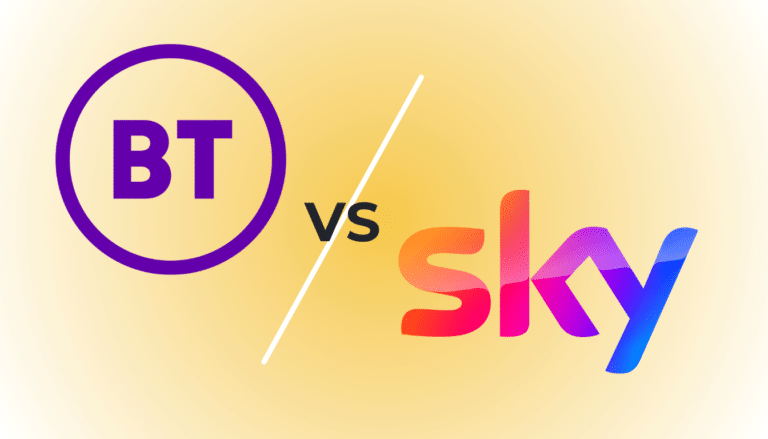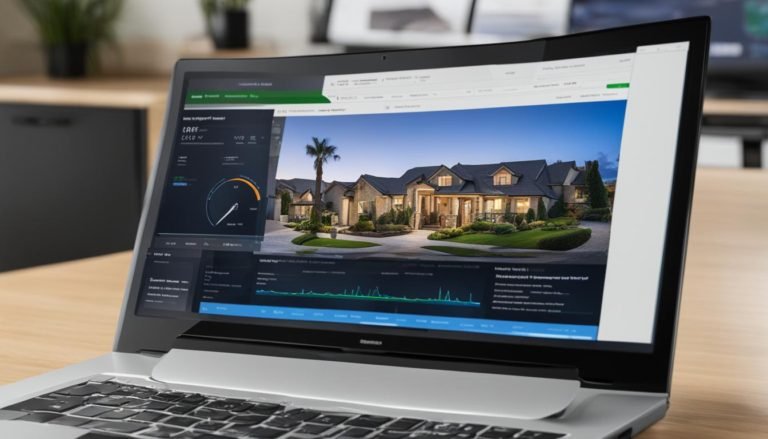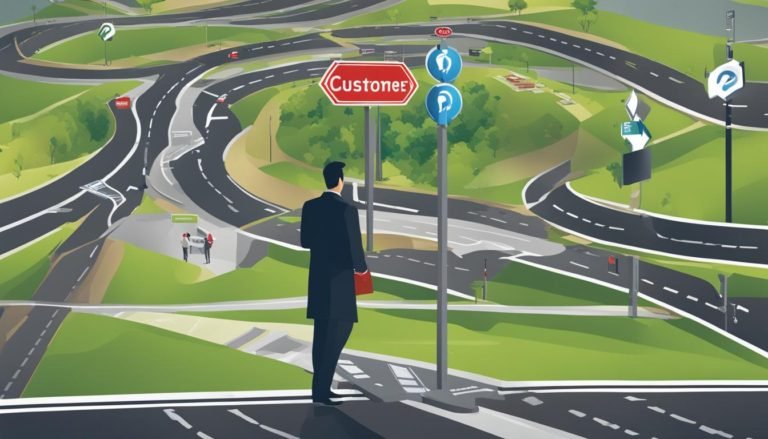Welcome to our article on the impact of 5G technology on broadband choices. As the deployment of 5G communication networks continues to expand, it is important to understand how this new technology will shape the options available to consumers. 5G offers several advantages such as superfast broadband speeds, ultra-reliable low latency communication, and increased availability. Let’s explore how these advancements may influence your broadband decision in the era of 5G.
Key Takeaways
- 5G technology is projected to generate $13.2 trillion in global economic value by 2035.
- With 5G, users can experience superfast broadband speeds and enjoy lag-free streaming and gaming.
- 5G plays a crucial role in expanding broadband availability, especially in remote or underserved areas.
- The deployment of 5G technology will revolutionize broadband choices in various industries.
- 5G has the potential to bridge the digital divide and enhance broadband connectivity in rural areas.
The Potential of 5G Technology
5G technology has the potential to revolutionize broadband choices by offering several key advantages. These include superfast broadband speeds, ultra-reliable low latency communication, and massive machine-type communications. With 5G, users can enjoy faster and more reliable internet connectivity, enabling them to stream high-definition content, participate in online gaming, and utilize smart home devices without any lag or connectivity issues.
One of the main benefits of 5G technology is its ability to provide superfast broadband speeds. With download speeds of up to 10 gigabits per second (Gbps), 5G significantly outperforms previous generations of wireless technology. This means that users can download large files, such as movies or software updates, in a matter of seconds, making tasks more efficient and seamless.
Additionally, 5G offers ultra-reliable low latency communication, which means that data can be transmitted with minimal delay. This is especially important for applications that require real-time responsiveness, such as online gaming or video conferencing. With 5G, users can enjoy a smooth and fluid experience without any noticeable lag or latency issues.

| Advantages of 5G Technology | Impact on Broadband Choices |
|---|---|
| Superfast broadband speeds | Users can download large files in seconds and enjoy seamless streaming of high-definition content. |
| Ultra-reliable low latency communication | Real-time applications like online gaming and video conferencing can be conducted without any noticeable lag or latency issues. |
| Massive machine-type communications | Enables the connection of a large number of devices, supporting the growth of the Internet of Things (IoT) and smart home technologies. |
5G technology brings numerous benefits to broadband choices, providing users with faster speeds, low latency, and improved reliability. With its superfast broadband capabilities, 5G opens up a world of possibilities for streaming high-definition content, online gaming, and utilizing smart home devices. The technology’s ultra-reliable low latency communication ensures that real-time applications run smoothly, without any noticeable lag or connectivity issues. With 5G’s potential for massive machine-type communications, the Internet of Things (IoT) and smart home technologies will experience significant growth, further enhancing the broadband experience for users.
Summary
5G technology offers several advantages that have the potential to revolutionize broadband choices. With superfast broadband speeds, ultra-reliable low latency communication, and massive machine-type communications, 5G provides users with faster and more reliable connectivity. This enables seamless streaming, online gaming, and utilization of smart home devices. 5G’s impact on broadband choices is evident in its ability to support real-time applications without lag or latency issues. Additionally, 5G’s potential for massive machine-type communications supports the growth of the Internet of Things (IoT) and smart home technologies.
The Role of 5G in Broadband Expansion
5G technology is set to revolutionize broadband expansion, playing a crucial role in increasing broadband availability across both urban and rural areas. With its high-speed connectivity and wireless capability, 5G can bridge the digital divide and ensure that more people have access to reliable internet services.
In urban areas, where traditional broadband infrastructure is already well-established, 5G can complement existing networks and provide additional capacity to meet the growing demand for high-speed internet. This allows users to enjoy faster and more reliable internet connectivity, especially during peak usage hours when traditional broadband services may experience congestion.
However, the true potential of 5G lies in its ability to expand broadband availability in rural and underserved areas. Unlike traditional broadband networks, which require extensive infrastructure investments, 5G can be deployed wirelessly, making it more cost-effective and feasible for remote locations. By utilizing wireless networks, 5G can provide reliable and high-speed internet access to areas where traditional broadband infrastructure may not be readily available.
Table: The Impact of 5G on Broadband Expansion
| Benefits of 5G in Broadband Expansion | Examples |
|---|---|
| Increased broadband availability | Remote areas with limited access to traditional broadband infrastructure |
| Improved connectivity in underserved areas | Rural communities with limited internet options |
| Cost-effective deployment | Wireless networks eliminate the need for extensive infrastructure investments |
By leveraging the capabilities of 5G technology, broadband providers can extend their services to previously underserved areas, enabling residents in rural communities to access the same level of connectivity as their urban counterparts. This not only enhances the quality of life for individuals living in these areas but also opens up new economic opportunities, allowing businesses to thrive and communities to prosper.
The Impact on Broadband Speed
As 5G technology continues to be deployed and integrated into our daily lives, one of the most significant impacts it has on broadband choices is the enhancement of internet speed. With its advanced infrastructure and higher frequency bands, 5G offers the potential for significantly faster download and upload speeds compared to previous wireless technologies. This means that users can experience seamless streaming, quick file downloads, and smooth browsing without the frustration of buffering or lag.
According to experts, 5G technology is expected to deliver speeds up to 100 times faster than 4G, reaching peak speeds of up to 10 gigabits per second. Such high speeds enable users to access and transmit data at remarkable rates, empowering them to make the most of bandwidth-intensive activities like online gaming, 4K video streaming, and virtual reality experiences. Whether it’s downloading a large file, streaming a high-definition movie, or participating in a video conference, 5G ensures that these tasks can be accomplished effortlessly and with minimal waiting time.
Furthermore, the low latency inherent in 5G technology significantly improves the overall browsing experience. Latency refers to the time it takes for data to travel from the source to its destination. With 5G, latency is reduced to as low as 1 millisecond, resulting in near-instantaneous response times. This low latency is particularly advantageous for real-time applications like video conferencing, cloud gaming, and remote collaboration, where delays can hinder productivity and user experience.
Table: Comparison of broadband speeds (Mbps)
| Technology | Download Speed | Upload Speed |
|---|---|---|
| 3G | 2-15 | 0.5-5 |
| 4G | 5-100 | 2-20 |
| 5G | Up to 10,000 | Up to 1,000 |
Table: Comparison of broadband speeds (Mbps)
Source: Adapted from OpenSignal
As shown in the table, 5G technology surpasses its predecessors in terms of download and upload speeds significantly. This improvement unlocks a world of possibilities, not only for individual users but also for businesses and industries that rely heavily on fast and reliable connectivity. With 5G’s transformative impact on broadband speed, we can expect a future where data-intensive applications are seamlessly integrated into our daily lives, enabling us to work, learn, and play more efficiently than ever before.
New Opportunities for Broadband Services
The emergence of 5G technology opens up new opportunities for broadband services. With its enhanced capabilities, 5G enables the development of innovative applications and services that rely on high-speed connectivity. This includes advancements in areas such as virtual reality, augmented reality, Internet of Things (IoT), and smart city technologies. Users can expect a wider range of broadband options and services tailored to their specific needs.
For instance, with the advent of 5G, the entertainment industry can explore new possibilities in delivering immersive experiences. Virtual reality (VR) and augmented reality (AR) applications can be seamlessly streamed with superfast speeds, allowing users to immerse themselves in virtual worlds or overlay digital information onto the real world.
“5G technology revolutionizes the way we experience entertainment. With the potential for ultra-fast speeds, users can indulge in VR and AR experiences like never before.”
Moreover, the Internet of Things (IoT) will greatly benefit from 5G-enabled broadband services. The increased bandwidth and low latency of 5G networks will support the seamless communication and coordination of numerous interconnected devices. This will pave the way for smarter homes, cities, and industries, enabling efficient automation, real-time monitoring, and intelligent decision-making.
As the era of 5G unfolds, broadband options will continue to evolve and cater to the growing demands of consumers. From immersive entertainment experiences to interconnected smart systems, 5G-enabled broadband services will shape the future of connectivity.
Table: New Opportunities for Broadband Services
| Opportunity | Description |
|---|---|
| Virtual Reality (VR) | Deliver immersive experiences with superfast speeds |
| Augmented Reality (AR) | Overlay digital information onto the real world |
| Internet of Things (IoT) | Support seamless communication between interconnected devices |
| Smart Homes | Enable automation and real-time monitoring for increased convenience and efficiency |
| Smart Cities | Facilitate intelligent decision-making and optimize resource utilization |
| Smart Industries | Enhance productivity and streamline operations through connected systems |
5G and Broadband Choices in Industries
When it comes to 5G’s impact on broadband choices, various industries stand to benefit from the enhanced connectivity options it offers. As 5G technology continues to mature and expand, industries such as manufacturing, transportation, healthcare, and public services can leverage its high-speed connectivity to optimize their operations and improve efficiency.
In the manufacturing sector, 5G-enabled Internet of Things (IoT) devices can revolutionize production processes. With real-time data analytics and enhanced connectivity, manufacturers can monitor and control their machines remotely, leading to optimized productivity and reduced downtime. This increased efficiency can ultimately translate to cost savings and improved competitiveness.
Transportation is another industry that can greatly benefit from 5G’s impact on broadband choices. With the ability to transfer large amounts of data quickly and reliably, 5G can enable more advanced applications in autonomous vehicles and smart transportation systems. This can enhance road safety, reduce congestion, and improve overall transportation efficiency.
The healthcare industry can also leverage 5G technology to transform patient care. With its low latency and high reliability, 5G enables telemedicine and remote monitoring capabilities, allowing healthcare providers to remotely diagnose and treat patients. This can improve access to healthcare services, particularly in remote or underserved areas, and enhance patient outcomes.
Table: Broadband Options for Different Industries in the 5G Era
| Industry | Benefits of 5G |
|---|---|
| Manufacturing | Optimized production processes, reduced downtime, cost savings |
| Transportation | Advanced applications in autonomous vehicles, improved road safety, reduced congestion |
| Healthcare | Telemedicine, remote monitoring, improved access to healthcare services |
| Public Services | Enhanced emergency response, smart city initiatives, improved public safety |
Public services, including emergency response and city infrastructure, can also benefit from the broadband options offered by 5G. With enhanced connectivity, emergency responders can access real-time information and coordinate their efforts more effectively. Additionally, 5G-enabled smart city initiatives can improve public safety, transportation systems, and overall quality of life.
In conclusion, the impact of 5G on broadband choices in various industries is significant. From manufacturing to healthcare to public services, 5G’s high-speed connectivity opens up new possibilities for optimizing operations, improving efficiency, and enhancing services. As the rollout of 5G networks continues, industries need to embrace the opportunities it presents and adapt their strategies to leverage its potential for growth.
The Role of 5G in Rural Broadband Connectivity
The deployment of 5G technology is set to revolutionize broadband connectivity in rural areas, providing improved options for residents who have historically faced challenges accessing reliable internet services. With its ability to utilize wireless networks, 5G can bridge the digital divide and bring high-speed internet access to remote locations where traditional broadband infrastructure may not be readily available.
By leveraging 5G technology, rural communities will have the opportunity to enjoy faster speeds and more reliable connections, enabling them to participate in online activities such as streaming, remote work, and distance learning. This will help level the playing field and ensure that individuals in rural areas have the same access to information and opportunities as those in urban areas.
In addition to enhanced connectivity, 5G can also open up new possibilities for economic development in rural areas. Industries such as agriculture, tourism, and small businesses can leverage the power of 5G to expand their operations, reach new markets, and improve efficiency. This can contribute to the overall growth and prosperity of rural communities.
The Benefits of 5G for Rural Broadband Connectivity
- Improved Speed: 5G technology offers significantly faster download and upload speeds compared to previous generations of wireless technology. This means that rural residents can enjoy seamless streaming, video conferencing, and other bandwidth-intensive activities without experiencing lag or buffering.
- Expanded Coverage: Wireless networks powered by 5G can provide broadband coverage to areas that were previously underserved or unserved by traditional broadband infrastructure. This expands the availability of internet services to rural communities, enabling them to connect with the world and access online resources.
- Reliable Connectivity: 5G’s ultra-reliable low latency communication ensures a stable internet connection, even in remote areas. This is particularly important for businesses and organizations, as it allows for seamless communication, real-time data transfer, and efficient operations.
In conclusion, 5G technology has the potential to greatly improve broadband options in rural areas. With its ability to leverage wireless networks, 5G can bridge the digital divide and provide reliable, high-speed internet access to remote communities. This not only enhances connectivity for residents but also opens up new opportunities for economic growth and development. As 5G networks continue to expand, rural areas can expect a brighter future with improved broadband options and enhanced connectivity.
The Future of Broadband Choices with 5G
The rise of 5G technology is set to revolutionize the future of broadband choices. With its superfast speeds, ultra-reliable low latency communication, and new opportunities for innovative services and applications, 5G will transform the way we connect and access the internet.
As 5G networks continue to expand and mature, users can expect even faster internet speeds and more reliable connectivity. This means faster downloads, smoother streaming, and seamless use of bandwidth-intensive activities such as online gaming and virtual reality experiences. With 5G, the future of broadband choices is destined to provide enhanced user experiences and cater to our increasingly digitized lifestyles.
One of the most exciting aspects of the future of broadband with 5G is the development of new applications and services that were not previously feasible. The enhanced capabilities of 5G technology will enable advancements in areas such as Internet of Things (IoT), smart city technologies, and telemedicine. This opens up a whole new world of possibilities and opportunities for both individuals and industries.
Overall, the impact of 5G on future connectivity options is immense. It promises to deliver faster speeds, lower latency, and improved reliability, transforming the way we access and utilize broadband services. With its potential to bridge the digital divide and bring high-speed connectivity to rural areas, 5G technology is paving the way for a future where broadband choices are more accessible and varied than ever before.
| Advantages | Challenges |
|---|---|
| Superfast broadband speeds | Cost of infrastructure upgrades |
| Ultra-reliable low latency communication | Ensuring widespread coverage |
| New opportunities for innovative services | Compatibility with legacy systems |
| Improved connectivity in rural areas | Regulatory considerations |
Broadband Providers and 5G Deployment
When it comes to the deployment of 5G technology, broadband providers play a crucial role. They are at the forefront of investing in, upgrading, and expanding their infrastructure to support the rollout of 5G networks. With their expertise and existing customer base, broadband providers are well-positioned to facilitate the adoption of 5G technology and ensure widespread connectivity.
To successfully deploy 5G, broadband providers need to develop effective strategies that take into account various factors. This includes planning for network coverage, capacity, and customer demand. By analyzing data and understanding the specific needs of different regions, broadband providers can strategically prioritize their 5G deployment efforts.
Collaboration between broadband providers, regulators, and other stakeholders is also essential for a smooth and efficient rollout of 5G networks. By working together, they can address any regulatory challenges, ensure compliance with licensing requirements, and optimize the use of available resources. This collaboration will help accelerate the deployment of 5G technology and maximize its impact on broadband choices.
Challenges and Opportunities
The deployment of 5G technology presents both challenges and opportunities for broadband providers. On one hand, the transition to 5G requires significant investments in infrastructure and equipment. This includes upgrading existing networks, installing new antennas, and implementing backhaul solutions to support the increased data traffic that 5G will bring.
On the other hand, the deployment of 5G also opens up new revenue streams for broadband providers. With the increased bandwidth and capabilities of 5G networks, providers can offer a wider range of services to their customers. This includes innovative broadband plans tailored to specific user needs, such as faster speeds for gaming or lower latency for real-time applications.
In conclusion, broadband providers play a crucial role in the deployment of 5G technology. They are responsible for investing in and upgrading their infrastructure to support 5G connectivity. By developing effective deployment strategies and collaborating with regulators and other stakeholders, broadband providers can ensure a smooth and widespread rollout of 5G networks, ultimately benefiting users and driving the future of broadband choices.
| Challenges | Opportunities |
|---|---|
| Significant investments in infrastructure and equipment | New revenue streams and innovative broadband plans |
| Regulatory challenges and compliance with licensing requirements | Wider range of services and enhanced user experiences |
| Optimizing the use of available resources | Accelerated deployment of 5G networks |
Conclusion
After exploring the impact of 5G on broadband choices, it is evident that this revolutionary technology is set to transform the connectivity landscape and shape the future of broadband options. With its superfast speeds and ultra-reliable low latency communication, 5G offers users an enhanced internet experience, allowing for seamless streaming, gaming, and utilization of smart home devices.
Furthermore, 5G opens up new opportunities for broadband services, enabling the development of innovative applications and services in areas such as virtual reality, augmented reality, and the Internet of Things. This means that users can expect a wider range of broadband options tailored to their specific needs, delivering even greater convenience and efficiency.
5G also has the potential to bridge the digital divide and improve broadband connectivity in rural areas. By utilizing wireless networks, 5G can provide high-speed internet access to remote locations where traditional broadband infrastructure may not be readily available, ensuring that residents in rural areas have access to the same level of connectivity as their urban counterparts.
In conclusion, the future of broadband choices with 5G is promising. As 5G networks continue to expand and mature, users can anticipate even faster speeds, lower latency, and more reliable connectivity. Broadband providers and other stakeholders must work together to ensure the successful rollout and adoption of 5G technology, ultimately benefiting all users with improved broadband availability and enhanced connectivity options.
FAQ
How will 5G technology impact broadband choices?
5G technology is expected to offer superfast broadband speeds, ultra-reliable low latency communication, and open up new opportunities for innovative services and applications.
What are the advantages of 5G for broadband selection?
5G technology provides faster download and upload speeds, seamless streaming of high-quality videos, and the ability to engage in bandwidth-intensive activities without buffering or slowdowns.
How does 5G contribute to increased broadband availability?
With its high-speed connectivity in both urban and rural areas, 5G can help bridge the digital divide and ensure that more people have access to reliable internet services.
Will 5G technology improve broadband speed?
Yes, 5G technology delivers significantly faster download and upload speeds compared to previous wireless technology, enabling a seamless internet experience.
What new opportunities will 5G create for broadband services?
5G enables the development of innovative applications and services in areas such as virtual reality, augmented reality, Internet of Things (IoT), and smart city technologies.
How will 5G impact broadband choices in industries?
Industries such as manufacturing, transportation, healthcare, and public services can leverage 5G’s high-speed connectivity to enhance operations and improve efficiency.
Can 5G technology enhance broadband connectivity in rural areas?
Yes, 5G’s wireless networks can provide reliable and high-speed internet access to remote locations where traditional broadband infrastructure may not be readily available.
What does the future hold for broadband choices with 5G?
As 5G networks continue to expand and mature, users can expect even faster speeds, lower latency, and enhanced connectivity options for new applications and services.
What is the role of broadband providers in 5G deployment?
Broadband providers are responsible for investing in and upgrading their infrastructure to support 5G connectivity, ensuring a smooth and widespread rollout of 5G networks.











